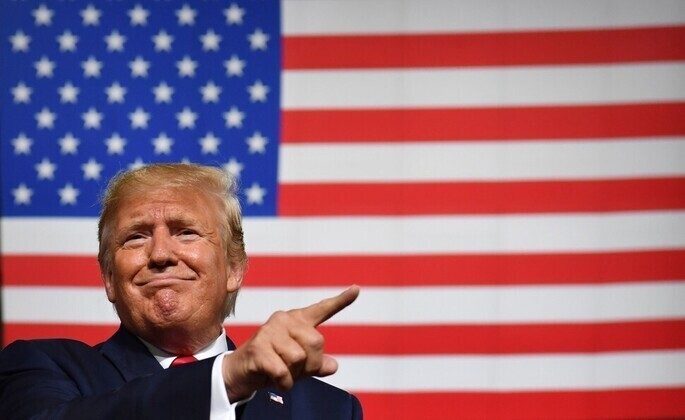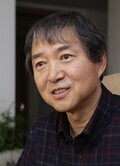hankyoreh
Links to other country sites 다른 나라 사이트 링크
[Column] Politics of hate and humanity in the time of COVID-19


By Chung Byung-ho, professor emeritus of anthropology at Hanyang University
“Did you happen to experience any anti-Asian hate on your way here?”
This was the question posed to me by someone I met in the US last month. While I had managed to avoid any major confrontations, I had actually experienced something.
When I had been driving alone, I stopped at a small restaurant just off the highway, where all the employees and customers were white. None of them was wearing a mask. I was, and the glares in my direction were fierce.
This was clearly a neighborhood that backed Donald Trump, who referred to COVID-19 as the “China virus.” Looking similar to a Chinese person in their eyes, I felt awkward in front of these people who seemed to consider me to be a virus myself.
“Should I keep wearing the mask or take it off?” I wondered. But I also felt uncomfortable about simply turning around and leaving, so I went inside and placed my order.
As my food arrived and I began to eat, a burly middle-aged man came up to my table. Standing over me, he said, “Why did you come here?”
Fortunately for me, I am a man, I am older, I am fairly large in frame, I can speak English — and most importantly, I had attended a nearby university. Fortunately for now, anyway.
But such is the nature of the politics of hate that we could see a day where none of that means anything. In many parts of the US, people with an Asian background — women, seniors, children — are already living in fear.
Out of nowhere, people shout slurs at them, spit in their faces, even assault them. Korean women were killed in a shooting in Atlanta; in San Francisco, an elderly Thai immigrant died after being forcefully shoved during a walk.
When people feel frightened, they tend to denounce and scapegoat vulnerable groups. As their fear intensifies, they form hate groups and start stigmatizing.
Even within the same ethnicities, people will ostracize and mistreat vulnerable segments.
A Korean Chinese care worker told me about how early on in the COVID-19 situation in South Korea, she would wear two masks and stay very quiet, dreading the glares from people who treated her as if she were a virus. Cluster infections at clubs in Seoul’s Itaewon neighborhood led to a barrage of overtly anti-LGBTQ remarks.
It’s the same principle that applies to discrimination against minorities. It isn’t just race or ethnicity — any kind of difference can be made into an excuse to discriminate, be it region, age, gender, religion, disability, or anything else.
The nature of the politics of hate lies in the way it takes these potential prejudices and sets them ablaze, turning them into hate toward a minority group and allowing — even approving of — violence against them.
Adolf Hitler is considered one of the most prominent examples, with his campaign of mass slaughter against Jews. But even in democratic countries, politicians like Trump and Japan’s Shinzo Abe have exploited discriminatory feelings to win support from mainstream groups.
“The only good Chinese is a dead one. LOL.”
This was a message posted on an anti-Chinese site in South Korea. It had thousands of “likes.” That may explain why we’re now seeing politicians discuss how “young South Koreans dislike China.”
But exchange and cooperation with China are a matter of economic survival for many South Koreans.
“Kill Koreans!”
That message was on an anti-Korean site in Japan. Last summer, a young Japanese arsonist set fire to Utoro, a Zainichi Korean village in Kyoto.
Even so, we can’t say that “young Japanese people dislike Korea” either. Even as Japanese politicians and media spew anti-Korean rhetoric, young Japanese people dine on Korean cuisine in Koreatowns and enjoy the music and TV of the Korean Wave. The lives of people in East Asia are already intertwined in complex ways that transcend national borders.
The COVID-19 crisis has really brought home how humankind is a community that shares its destiny.
The virus makes no distinctions of ethnicity or nationality. It continues to mutate due to issues such as unfair vaccine distribution.
Global concerns like climate change and COVID-19 demand a response at the level of humankind. But most leaders have been focusing only on responding at the levels of nations and groups. Indeed, some of them are exploiting the public’s fears and anxieties to foment hatred against minorities.
What this era requires is not leadership centered on conquest and control, but leadership that values cooperation and shared benefits. We need people working to heal the world’s scars and turn it back into a place where different lives can coexist, rather than emphasizing the narrow interests of a particular region, ideology, or demographic.
In nomadic societies, we find cultural practices of welcoming travelers and victims of disasters. After all, any one of us could end up losing our way or suffering misfortune in a foreign land.
When I tend to a stranger I meet today, I may be rescuing my future self or my family from some misfortune we may suffer tomorrow. This is the sort of survival wisdom that humankind really needs to internalize in an era of global disaster and migration.
We need new attitudes about the boundaries that distinguish us from others. We should not simply take it as given that people will be discriminated against or excluded simply because they are different.
As a first step, we need to enact laws prohibiting all forms of discrimination, and we need broad-reaching education on these principles. This is not merely a matter of schooling — we need to harness a wide range of cultural capacities toward this effort, including media, television, and even games.
We must make the shift from the narrow “us” to the larger “us.” Hopefully, 2022 will be year one in establishing our own identity and practice as individual members of the human race.
Please direct questions or comments to [english@hani.co.kr]

Editorial・opinion
![[Column] Season 2 of special prosecutor probe may be coming to Korea soon [Column] Season 2 of special prosecutor probe may be coming to Korea soon](https://flexible.img.hani.co.kr/flexible/normal/500/300/imgdb/original/2024/0426/3317141030699447.jpg) [Column] Season 2 of special prosecutor probe may be coming to Korea soon
[Column] Season 2 of special prosecutor probe may be coming to Korea soon![[Column] Park Geun-hye déjà vu in Yoon Suk-yeol [Column] Park Geun-hye déjà vu in Yoon Suk-yeol](https://flexible.img.hani.co.kr/flexible/normal/500/300/imgdb/original/2024/0424/651713945113788.jpg) [Column] Park Geun-hye déjà vu in Yoon Suk-yeol
[Column] Park Geun-hye déjà vu in Yoon Suk-yeol- [Editorial] New weight of N. Korea’s nuclear threats makes dialogue all the more urgent
- [Guest essay] The real reason Korea’s new right wants to dub Rhee a founding father
- [Column] ‘Choson’: Is it time we start referring to N. Korea in its own terms?
- [Editorial] Japan’s rewriting of history with Korea has gone too far
- [Column] The president’s questionable capacity for dialogue
- [Column] Are chaebol firms just pizza pies for families to divvy up as they please?
- [Column] Has Korea, too, crossed the Rubicon on China?
- [Correspondent’s column] In Japan’s alliance with US, echoes of its past alliances with UK
Most viewed articles
- 1‘We must say no’: Seoul defense chief on Korean, USFK involvement in hypothetical Taiwan crisis
- 2AI is catching up with humans at a ‘shocking’ rate
- 3[Column] Season 2 of special prosecutor probe may be coming to Korea soon
- 4Division commander ordered troops to enter raging flood waters before Marine died, survivor says
- 5Is Japan about to snatch control of Line messenger from Korea’s Naver?
- 6The dream K-drama boyfriend stealing hearts and screens in Japan
- 7Korea protests Japanese PM’s offering at war-linked Yasukuni Shrine
- 8“Korea is so screwed!”: The statistic making foreign scholars’ heads spin
- 9‘Weddingflation’ breaks the bank for Korean couples-to-be
- 10Korea sees more deaths than births for 52nd consecutive month in February